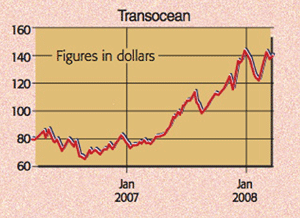
Every day more than two billion barrels of oil change hands in the financial markets. Deciding on what price to trade from one moment to the next must be a nightmare for the average trader. There are no figures for oil demand from China or India that you can draw up on your Bloomberg screen, and how exactly do you assess the impact of something like the assassination of Benazir Bhutto, or a rocket test in North Korea, on the price of a barrel of oil?
Luckily for the rest of us, we get to focus on the big picture when it comes to oil. Indeed, while the price of oil might slip back in the coming months as traders realise the US economy is in recession, the main story in the oilfields (that it’s getting harder and harder to find the stuff) hasn’t changed.
After decades of being able to tap giant reserves in Texas, Kuwait and Siberia, the oil industry is having to go to great lengths to keep up with demand: exploring war-torn countries, sinking drills in the deepest reaches of the ocean and going to enormous expense to sift through the muck of the Canadian tar sands.
That’s why suppliers of oil services should weather any correction in the oil price. Just about every land rig that oil companies can get their hands on is already in use and the industry is crying out for new engineers so they can sink new drills. Years of cheap oil and a “just get it out of the ground” approach to exploration has meant that oil groups have neglected to invest in the equipment they now need.
The shortage is particularly acute among deep-sea drillers. Much of the world’s oil and gas reserves are trapped between layers of rock buried beneath the ocean floor. Tapping these reserves requires sophisticated rig equipment, such as drillships and semi-submersibles, that have to be leased from offshore rigging companies. But there aren’t many of these contractors around. There are only five companies with the capacity to drill in the deepest waters, and when you add those five fleets together, there are just 51 active rigs capable of drilling in water depths of 3,000 to 9,999 feet and only 11 active below 10,000 feet.
The cost of leasing these drills is becoming a real headache for oil producers. Day rates were running at about $125,000 in 2004, but the big rig companies are now securing $600,000 a day for their ultra-deepwater rigs. And as old contracts come to an end, they stand to lock in that huge leap in rig rates for up to four or five years.
You’d normally expect this demand to result in massive building of new inventory. But at the highest end of the market, a deepwater drill costs in the region of $750m to build today, and would take at least three years to deliver, notes Toby Shute on Motley Fool. Understandably, therefore, drillers have been holding off on building new fleets even as day rates have escalated.
This means that even if the oil price does falter (and strictly in terms of the fundamentals of supply and demand, the price of oil should be about $80, according to Ruchir Kadakia from Cambridge Energy Research – still extremely high by historic standards), the companies leasing deepsea drills will still easily be able to demand high rig rental rates from the big oil groups. We have a look at a company set to benefit in the box below.
Transocean: a titan in a booming market
The biggest player in the drilling market is Transocean (NYSE:RIG). Unlike its peers, Transocean has focused on deepwater drilling and has been reaping the benefits as it comes off the back of the longer contracts that come with that area of the market. The driller recently secured the first of many new renewal contracts at $600,000 a day through to 2011 and trumped earnings estimates with a 172% jump for the fourth quarter, with analysts expecting profits to rise 32% this quarter.
With the $18bn acquisition of peer GlobalSantaFe last year, Transocean has also made a move into shallower waters. This has allowed it to sell off some of the shallow-water drills, securing $320m from Hercules Offshore for three jack-up rigs.
The company’s backlog of orders is already large and is growing. And with Petrobas’s “staggering” discovery in the Tupi field off Brazil likely to throw up between 25 and 50 years’ worth of new drilling, and big oil producers racing to tap the high seas, Transocean will continue to reap the rewards of its dominant position in deepwater drills. The group has seen its shares rise by more than 75% since we tipped it last year, yet the company remains attractively priced on a forward p/e of 8.2. With a price-to-earnings-growth ratio of 0.25, you will be picking up on earnings growth remarkably cheaply.